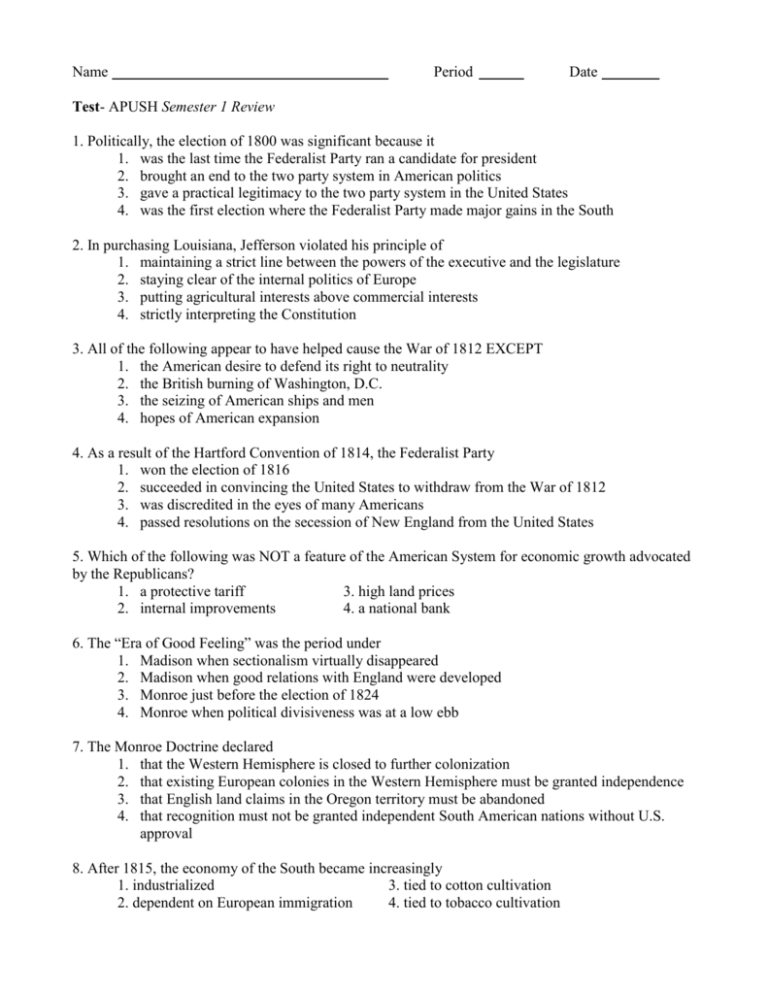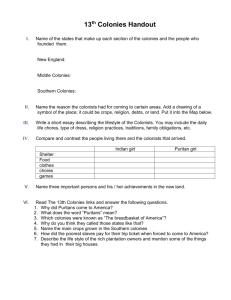Name Period Date Test- APUSH Semester 1 Review 1. Politically
advertisement

Name Period Date Test- APUSH Semester 1 Review 1. Politically, the election of 1800 was significant because it 1. was the last time the Federalist Party ran a candidate for president 2. brought an end to the two party system in American politics 3. gave a practical legitimacy to the two party system in the United States 4. was the first election where the Federalist Party made major gains in the South 2. In purchasing Louisiana, Jefferson violated his principle of 1. maintaining a strict line between the powers of the executive and the legislature 2. staying clear of the internal politics of Europe 3. putting agricultural interests above commercial interests 4. strictly interpreting the Constitution 3. All of the following appear to have helped cause the War of 1812 EXCEPT 1. the American desire to defend its right to neutrality 2. the British burning of Washington, D.C. 3. the seizing of American ships and men 4. hopes of American expansion 4. As a result of the Hartford Convention of 1814, the Federalist Party 1. won the election of 1816 2. succeeded in convincing the United States to withdraw from the War of 1812 3. was discredited in the eyes of many Americans 4. passed resolutions on the secession of New England from the United States 5. Which of the following was NOT a feature of the American System for economic growth advocated by the Republicans? 1. a protective tariff 3. high land prices 2. internal improvements 4. a national bank 6. The “Era of Good Feeling” was the period under 1. Madison when sectionalism virtually disappeared 2. Madison when good relations with England were developed 3. Monroe just before the election of 1824 4. Monroe when political divisiveness was at a low ebb 7. The Monroe Doctrine declared 1. that the Western Hemisphere is closed to further colonization 2. that existing European colonies in the Western Hemisphere must be granted independence 3. that English land claims in the Oregon territory must be abandoned 4. that recognition must not be granted independent South American nations without U.S. approval 8. After 1815, the economy of the South became increasingly 1. industrialized 3. tied to cotton cultivation 2. dependent on European immigration 4. tied to tobacco cultivation 9. Which of the following was NOT included in the Missouri Compromise? 1. Missouri was to be admitted to the Union as a slave state 2. No future slave states were to be admitted to the union 3. Maine was to be admitted to the Union as a free state 4. Slavery was to be prohibited in the northern part of the Louisiana Territory 10. Lowell, Massachusetts, became famous as 1. the site of the first labor strike 2. the city housing the first technical school in the United States 3. a model for ideal working conditions 4. the center of the growing abolitionist movement 11. Chief Justice John Marshall asserted that only Congress, not the states, possessed the power to control interstate commerce. The case was 1. Marbury v. Madison. 2. McCulloch v. Maryland. 3. Cohens v. Virginia. 4. Gibbons v. Ogden. 12. The Erie Canal revolutionized domestic markets because it permitted the 1. shipment of wheat from Chicago to the Pacific Northwest. 2. transfer of goods from New York to New Orleans along inland waterways. 3. movement of cotton from the Deep South to New England. 4. transport of gold from California to the east coast. 13. Madison wrote the Bill of Rights because he 1. was the person who thought they should be part of the Constitution from the start 2. feared the federal government would deprive Americans of liberties not expressly listed 3. was ordered to by President Washington 4. believed an additional check on the legislature was need 14. Hamilton’s financial program consisted of all of the following EXCEPT 1. incentives for agricultural growth 3. assumption of state debts from the Revolution 2. establishment of a national bank 4. establishment of protective tariffs 15. Washington's Farewell Address in 1796 1. warmly endorsed the appearance of two contending political parties in America. 2. warned against the dangers of permanent foreign alliances. 3. was delivered to a joint session of Congress by Washington himself. 4. proposed a two-term limitation on the presidency. 16. A revolution in what country made American neutrality an issue in the 1790s? 1. Great Britain. 2. Spain. 3. the Netherlands. 4. France. 17. Alexander Hamilton’s argument that the government has the power to create a National Bank is based on which part of the Constitution? 1. the Preamble 2. the elastic clause 3. guarantees to the States 4. the Bill of Rights 18. The first two political parties disagreed on all of the following issues EXCEPT 1. western expansion 2. interpretation of the Constitution 3. national versus states’ rights 4. support for Britain and France 19. A Democrat-Republican most probably favored 1. increasing the authority of the National government 2. high tariffs on manufactured goods 3. strong states’ rights 4. the Bank of the United States 20. The Virginia and Kentucky Resolutions rested on the political doctrine of 1. nullification 2. virtual representation 3. popular sovereignty 4. one man, one vote 21. The major cause of Bacon’s Rebellion was 1. the poor treatment of black slaves in Georgia 2. British imposition of a tax on all exports leaving the colonies 3. the limited opportunities open to former indentured servants 4. Virginia’s imposition of a tax on the purchase of land 22. The Declaratory Act of 1766 1. required the colonists to provide barracks and supplies for British troops. 2. established a new duty on molasses. 3. stated that parliament had the power to make laws binding on the colonies. 4. established a tax on licenses, legal documents, and newspapers. 23. Local governments operated in New England by means of 1. church meetings 3. county council sessions 2. county court sessions 4. town meetings 24. The British response to the American claim of no taxation without representation was that 1. colonial assemblies would be permitted to vote on all new taxes. 2. monies raised through taxes would be used for internal improvements in the colonies. 3. American approval was necessary for internal taxes. 4. members of Parliament represented the interests of all people in the British Empire. 25. In the early 1600s, migrants to New England differed from those who went to the Chesapeake in that 1. New England settlement was sponsored by individual proprietors. 2. New Englanders immigrated in family groups. 3. in the harsher climate of New England, new arrivals often succumbed to disease and death. 4. New England immigrants tended to be motivated by a desire for wealth. 26. The effects of the Great Awakening included all of the following EXCEPT 1. a split in Calvinism between the Old Lights and the New Lights 2. the undermining of the position of the clergy 3. the growth of religious diversity 4. increased respect for the education and learning of the ministry 27. Literacy was high in the colonies because 1. free public education was provided by England to all of its subjects 2. most colonists lived in coastal cities where reading was essential to employment 3. education was highly valued in England, the homeland of most colonists 4. most colonists were Protestants who believed Bible reading was required for salvation 28. The English philosopher John Locke had a lasting influence on the colonies through his 1. theory that everyone possessed natural rights 2. argument that people were born with innate moral values 3. theory in the capitalist theory of economics 4. belief that the basic natural law of society is conflict 29. The most divisive issue among the colonies in the early 1700’s was 1. the problem of slavery 2. high tariffs between the colonies 3. Western land claims 4. whether independence from England should be declared 30. How did the colonists react to the Proclamation of 1763? 1. The immediately formed committees of correspondence to rally colonial opinion against it 2. They sent delegations to the king with a petition to repeal it 3. They ignored it, thinking it unenforceable 4. They sought out Indian alliances to oppose the British presence 31. The program of George Grenville, was designed to 1. deal with England’s financial problems by raising revenues from the colonies 2. reduce the colonies to a state of bankruptcy 3. extract revenue from the colonists for their refusal to fight in the French and Indian War 4. encourage colonial economic independence from England 32. The Stamp Act Congress was significant because it 1. demonstrated that the colonies were loyal to Parliament. 2. led directly to the First Continental Congress. 3. failed to persuade Parliament of colonial discontent. 4. marked an important step toward the unity of the colonies. 33. In Common Sense, Thomas Paine argued for 1. colonial independence from England 2. dominion status for the colonies 3. loyalty to the king rather than Parliament 4. colonial representation in Parliament 34. The purpose behind the Fundamental Orders was 1. to establish representative government in Connecticut 2. form a federated Union of North and South Carolina 3. establish religious freedom in Rhode Island 4. show the unity of Puritans in opposition to the Navigation Acts 35. Which of the following characterized life in the Chesapeake region in the early 17th century 1. a relatively long life expectancy compared with that in the harsh environment of New England. 2. rapidly developing urbanization. 3. a population density which required residents to live in close proximity to neighbors. 4. the presence of many more men than women, giving women somewhat greater status because of their scarcity. 36. Metacomet (aka King Philip) is probably best known for 1. saving the Puritans during the first harsh winter in the New World 2. attacking the English at Jamestown 3. offering a peace treaty so that would enable Indians to live on lands reserved for them 4. fighting the last war against the Puritans in New England 37. Religious freedom was expressly granted in the colonies of 1. Mass Bay and Rhode Island 3. Connecticut and Virginia 2. Jamestown and Maryland 4. Rhode Island and Maryland 38. The Mayflower Compact could best be described as 1. a complete constitution. 2. a business contract. 3. a foundation for self-government. 4. an enumeration of the causes for leaving England and coming to the New World 39. Antebellum reform leaders usually came from the ranks of the 1. newly arrived immigrants from Northern Europe 2. the very richest of Americans 3. the poor, who were most aware of their problems 4. the old middle class families from rural areas and small towns in New England 40. In the Dred Scott case, the Supreme Court ruled that 1. Dred Scott was not a citizen of the United States. 2. Dred Scott could not legally sue in a federal court. 3. the Missouri Compromise was unconstitutional. 4. Congress had no power to ban slavery from a territory. 5. all of these choices are correct.









